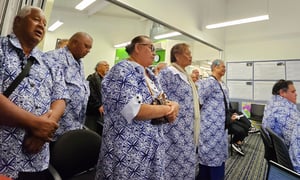Pacific parents in the Auckland region will now be able to vaccinate their toddlers against the measles outbreak at 12 months and not wait until they’re 15-months-old.
Known as the MMR (measles, mumps and rubella) vaccine, its is normally given at 15 months but the schedule shift by Auckland Regional Public Health Service comes in response to a measles outbreak in the city with cases appearing largely in young children.
Clinical director for ARPHS Dr Julia Peters says “We’ve seen that over 40% of cases are in children under 5 years of age and in particular there is a high proportion of those in under 2-year-olds, so by bringing this vaccination forward we can add a little bit of added protection.”
It’s being labeled a “region wide problem” after the first cases appeared in West Auckland and then increased in numbers across the city. Robert says the vaccination is the only way children can be protected at this stage of the outbreak.
So far 104 cases have been diagnosed with Pasifika making up 35% of cases. Peters says whilst Māori and Pacific were proactive in receiving their jabs, vaccination levels across Auckland were not high enough to prevent measles outbreaks.
“We need them to be at about 95% of the population. What we are really seeing is in the high 80% so that is not enough.”
Starship Community nurse Leilani Hipa says it’s important people received a second jab to be extra precautious.
“As Pacific Islanders we love our big families and this is an extremely contagious virus. So if you have people in your home, say young babies under a 1 year that haven’t been vaccinated yet and someone’s carrying that measles virus it can spread quite quickly and it is life threatening.”
The last outbreak in 2014 saw the biggest impact in people aged 10-19 year. Peters says it is hard determine why the outbreak is appearing in younger citizens.
“It could be a slightly different strain, there could be a shift in the virus or it maybe just the pockets of the community that it’s gotten in to but for whatever reason it is really impacting hard on our little young children and most vulnerable citizens.
“That’s not to say that young people aged 13-29 were not affected, they are the next most affected group. About 30% of cases are appearing in that age group as well.”
Medical experts are urging families to book an appointment with a GP as early as possible.











